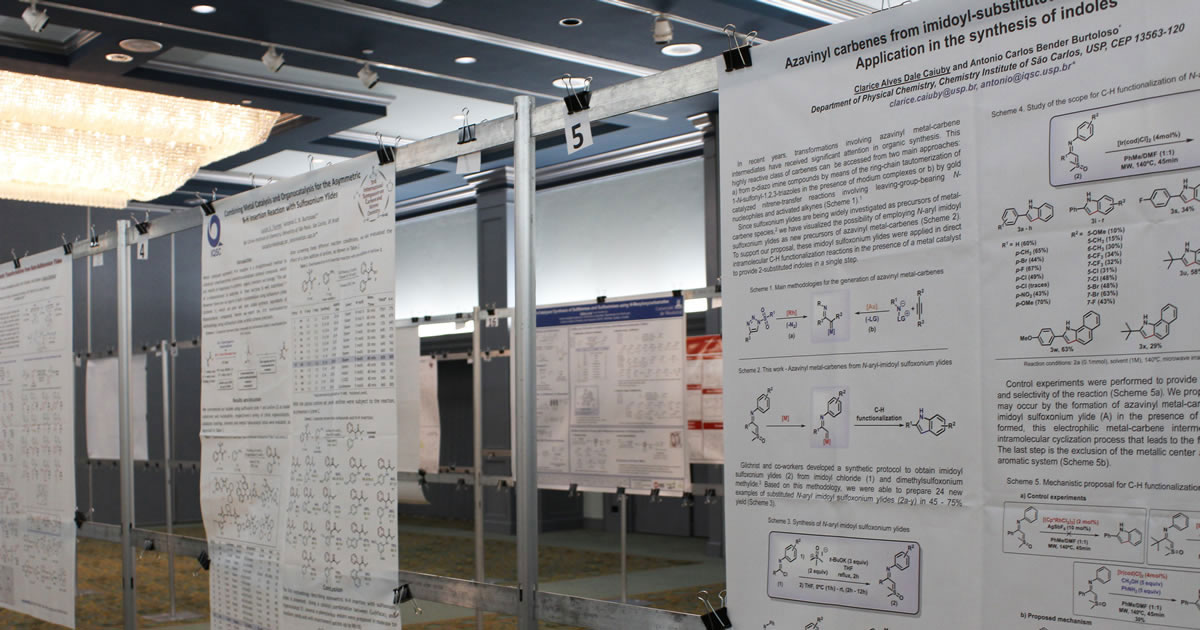Posted on February 10, 2020 by College of Sciences

UTSA Hosts International Symposium on Metal Carbenes and Nitrenes
By Lauren Moriarty
UTSA's Department of Chemistry recently hosted scientists from around the world for the Third International Symposium on Metal Carbenes and Nitrenes. Attendees discussed new reactions and synthetic methodologies based on metal carbenes and nitrenes as well as asymmetric catalysis in metal carbene and nitrene reactions, C-H functionalization, addition and cycloaddition, ylide transformations, applications of metal carbenes and nitrenes in natural product synthesis, structure and reaction mechanisms of metal carbenes and nitrenes, and metal carbenes and nitrenes in biology and material sciences. The conference began with opening remarks from David Silva , Dean of UTSA's College of Sciences, Bernard Arulanandam , Vice President for Research at UTSA, Michael P. Doyle , UTSA's Rita and John Feik Distinguished University Chair in Medicinal Chemistry, and Professor Pauline Chiu from the University of Hong Kong.
Graduate students Jacqkis Davis and Eshwarawarige Heyli Fernando traveled from the University of North Texas to attend the symposium. Although their work focuses on asymmetric catalysis, they hoped to broaden their knowledge of the symposium topics. "Our research is not related to carbene chemistry, but we wanted to learn more about it," said Fernando. "So far it's been very good, very interesting," added Davis.
Huw Davies , the Director of NSF Center for Selective C-H Functionalization at Emory University and Asa Griffs Professor of Chemistry, said the symposium was an important gathering. "It brings a whole range of different scientists who are connected to a central theme," he said. "That theme involves very unusual chemistry and because it's so unusual it can lead to entirely new ways of thinking about making new compounds. That's really important because if you can't make something in an effective way, it will never be a valuable product." Davies has deep roots in the metal carbene and nitrene chemistry field. "Mike [Doyle] and I have been involved in this field for a very long time, so we are pioneers of how this chemistry has developed," he said. "It's very exciting to see all of the people here."
Dorota Gryko , Professor of Chemistry and Director of Ph.D. Studies at the Institute of Organic Chemistry, Polish Academy of Sciences in Warsaw, was excited to pursue collaboration opportunities with fellow attendees. "I want to see in which direction the field has evolved and I would like to meet people who are leading this type of chemistry," she said. Gryko is the 2020 recipient of Marie Curie's Award for Collaborative Research.
Bas de Bruin , Professor of Chemistry at Van 't Hoff Institute for Molecular Chemistry in Amsterdam, said that the symposium was an ideal platform to gain new knowledge. He added that the important challenges in today's world depend on new synthetic methodologies and development of new methods to prepare the molecules. "If we can do that with carbene and nitrene chemistries that's a huge advantage, because if you can use existing molecules to do late stage functionalization you can create a new large diversity of bioactive molecules," he said. "You can also use them for ring closure reactions. These rings are not easy to synthesize at all. With carbene and nitrene chemistry, you can make a new range of compounds, which are very important building blocks for medicines." The University of Amsterdam will be the site of the next International Symposium on Metal Carbene and Nitrene Chemistry in 2021.
Xinfang Xu , Professor of Chemistry at Soochow University in China, believes that this year's successful symposium bodes well for the future of carbene and nitrene chemistry. "I think this group will become bigger; it's at the very beginning," he said. "More and more people will be involved in this circle." Xu said that the collaborative opportunities the symposium allows are invaluable to furthering our understanding of how metal carbene and nitrene chemistry can improve day-to-day life. "If you do it by cooperation, you can do something no one has done before. If you work alone, maybe you can do good, but you're not in the leading position."

